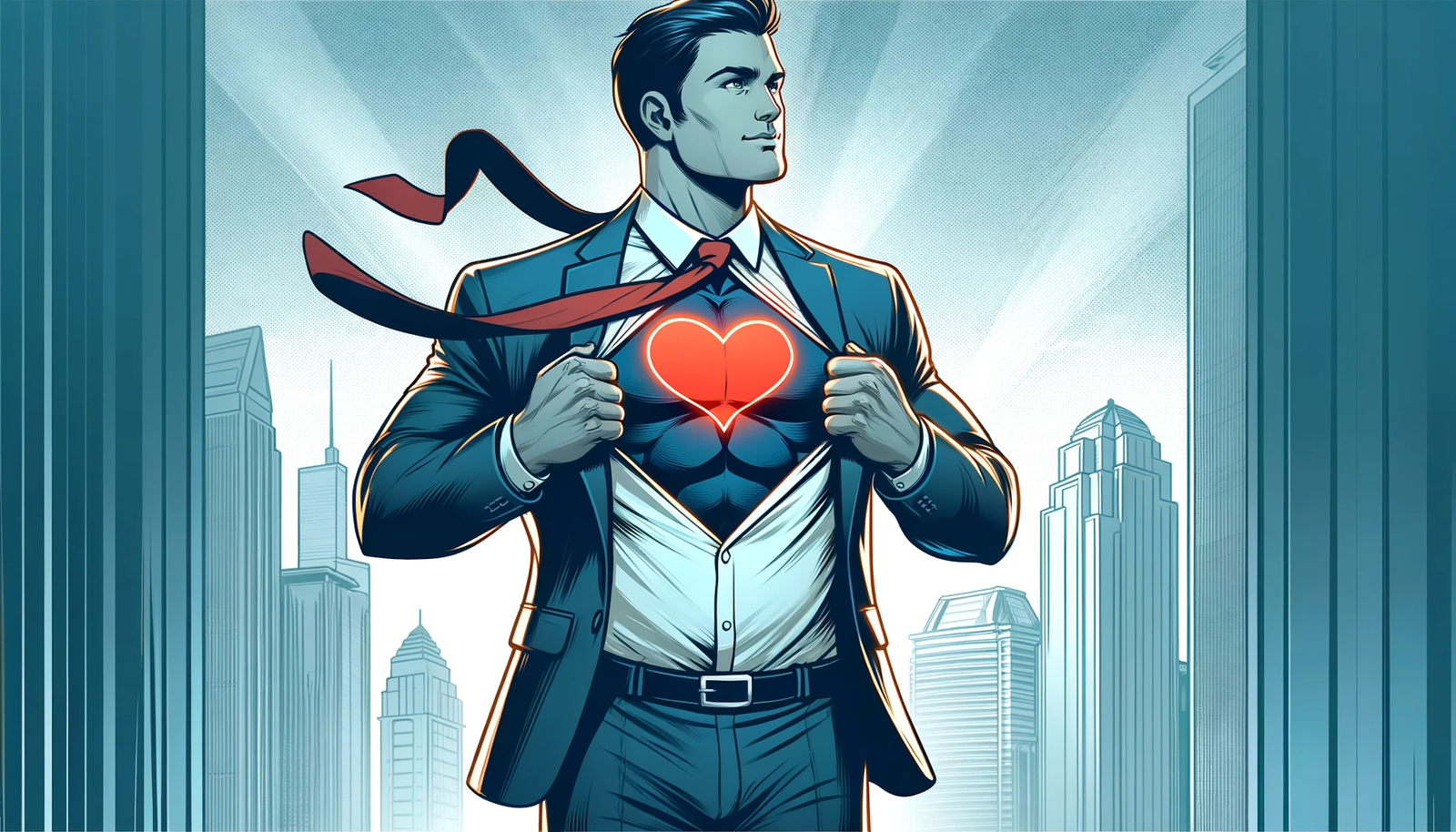Revisiting Masculinity: The Power of Vulnerability
Forget the steely eyed alpha male who never flinches but sits stoically and stone faced no matter what. Skyrocketing levels of depression and suicide in men as well as broken relationships, anger issues and addictions tell us there is nothing admirable or healthy about perpetuating the old toxic masculine stereotypes.
A growing number of men want to rewrite the script and forge a new definition of being a man that includes vulnerability. And yes, I am the first to acknowledge the term vulnerability immediately has my mind jumping to someone emoting, leaving their underbelly exposed and their head buried down crying.
Here’s the thing, there is a way to do vulnerability that is still and confident and masculine. It paves the way for not having to be perfect all the time, for sharing where we’re at and that it’s also okay to ask for help. That doesn’t mean having to walk the tightrope between “weak” and “sensitive”. This is our time to redefine being real and get grounded, because out of it comes something bigger. Connection, not having to feel like you are the only one suffering, to take away some of the boulders that sit on your shoulders weighing you down.
Sure, it’s a bit scary to challenge old definitions. You might have grown up with some very spoken or unspoken definitions about what it means to be a ‘ real man’. Men have been conditioned to mask their emotions, to equate vulnerability with weakness and to look invincible and never let them see that they hurt you. Slowly and steadily we are ready to evolve into a new definition. It’s also backed up by solid research and along with the voice of influential thought leaders inviting us to leave it behind with many of the last stereotypes and prejudices of last century.
Men that are ready to transcend old definitions and conditioning can expect to find new levels of depth, better mental health and a grounded and more authentic life. That means freeing up space in your busy mind and fewer sleepless nights tossing and turning when everything you tried to stuff down creeps it way back in the darkest and quietest moments of the day.
Strength in Vulnerability: Transforming Relationships and Well-being
For too long, we’ve been fed the old adage: “Real men don’t cry”. This notion, deeply ingrained into too many corners of society shames us into a version of masculinity about toughness, control, and emotional invulnerability. It affixes its self to the great man theory of leadership and superheroes and cowboys and the command and control structures of the military.
All of those structures are crumbling away and be called out for their toxicity. Terms like ‘mansplaining’ and ‘okay boomer’ start to call out and challenge outdated beliefs about men needing to be in charge and how privilege for too long has kept out a diversity of talents and perspectives across a wide range of environments. Heck, even the notion of masculinity and femininity are giving way to a broader less binary view which includes non-binary and agender identities.
Instead we’ve learned that the most successful organizations come together as teams and have a leadership style that promotes collaboration and empowerment rather than the hero. We also want leaders that allow us to feel like we are seen and heard. Want to be future forward? Spend a moment reflecting on this quote from Brene Brown’s book Dare to Lead: “Vulnerability is the birthplace of innovation, creativity and change.” That’s right if we can’t make mistakes, be uncertain and work through hard conversations we aren’t going to be the ones making the next breakthroughs.

Vulnerability Unveiled: More Than Just Emotion
As I mentioned previously, we can often have a belief that vulnerability means weakness. Let’s challenge that right now. Vulnerability, at its core, is about openness, authenticity and the courage to fully be yourself. It’s being able to openly acknowledge your fears, to express emotions, and be genuine in your interactions. It’s not a one size fits all concept either. There is a range and degrees to it. It’s not about crying at the drop of a hat; it’s about being true to your emotions and expressing them in a way that is authentic to you.
Embracing vulnerability doesn’t mean you abandon your strength; it means you draw from a deeper, more genuine source of power. It’s about being calm and clear from the inside out, understanding that your greatest strength lies in your willingness to be real, to connect, and to grow. That doesn’t sound like weakness to me, that sounds like a powerful place to operate from.
The Challenges in Embracing Vulnerability
As a man, embracing vulnerability may feel like charting unfamiliar territory. It’s challenging because it goes against the grain of what many of us have been taught about masculinity. The fear of being perceived as weak, of losing respect, or of not living up to societal standards can be daunting. But these challenges also represent an opportunity—an opportunity to break free from constraints, to evolve, and to embrace a more authentic version of yourself.
Statistics show that men who embrace vulnerability and seek emotional support have better mental health outcomes and more fulfilling relationships. According to the American Psychological Association, vulnerability and emotional openness are linked to lower levels of stress, anxiety, and depression among men. It’s making the hard choice to put your own wellness and peace of mind ahead of outdated thinking and stereotypes.
A New Vision of Strength: Embracing Emotional Openness
When you allow yourself to be vulnerable, you open the door to genuine connections and deeper relationships. Being vulnerable means you’re confident enough in yourself to let your guard down, to be seen for who you truly are. This authenticity is magnetic; it draws people in and fosters trust and respect. Vulnerability is also the of new ideas and creating all new paradigms, something we need if we are going to solve complex and challenging problems. When you’re open to your own emotions and experiences, you can tap into a wellspring of inspiration and insight.
In another book of hers, Rising Strong, Brene Brown observes: “Vulnerability is not winning or losing; it’s having the courage to show up and be seen when we have no control over the outcome. Vulnerability is not weakness; it’s our greatest measure of courage”

Vulnerability: The Gateway to True Intimacy and Love
In the heart of every strong, resilient man lies the capacity for profound intimacy and love, a capacity that flourishes most fully when vulnerability is embraced. Vulnerability, in its essence, is the courage to be your true self, to lay bare your hopes, fears, and dreams. It’s about letting go of the facades and embracing authenticity, even in the face of uncertainty. And it’s in this space of openness and honesty that the deepest connections are formed and nurtured.
Whether you’re navigating the waters of a long-standing marriage of 20+ years or steering through the dynamics of a new relationship later in life, vulnerability stands as the cornerstone of true intimacy. It’s the ingredient that transforms superficial interactions into profound connections, fostering a bond that is built on trust, understanding, and an unwavering commitment to one another’s growth and happiness.
In a long-term marriage, vulnerability helps in rediscovering each other, in peeling back the layers that time and routine may have imposed. It invites continuous growth and exploration, ensuring that the journey together is one of constant discovery and deepening love.
In the context of a second marriage, or a new relationship later in life, vulnerability is equally crucial. It paves the way for a foundation of authenticity and open communication, where past experiences are shared not as baggage but as lessons and stepping stones to a future filled with mutual respect and understanding.
Embracing vulnerability in your relationships means having the courage to express your needs, to share your emotions openly, and to listen with empathy and openness. It’s about creating a safe space where both partners can be their true selves, without fear of judgment or rejection. This level of openness and trust cultivates an environment where intimacy flourishes, conflicts are navigated with compassion, and the bonds of love are strengthened.
In every interaction, remember that vulnerability is not a sign of weakness, but a testament to your strength and commitment to fostering a relationship that’s rooted in authenticity, trust, and unconditional love. Those my friend are the secrets to long, healthy, happy relationships. It means showing up to love with your full self and learning you are lovable and worthy not in spite of your imperfections but because of them. This is the kind of love we all aspire to.
The Impact of Vulnerability in Men’s Lives
The journey towards embracing vulnerability is personal and unique, yet the stories of those who’ve navigated this path can offer inspiration and insight.
Consider the story of Michael, a senior executive in a Fortune 500 company. Known for his tough exterior and no-nonsense approach, Michael seemed the epitome of traditional masculinity. However, a personal crisis led him to reevaluate his approach to life and leadership. He began to openly start sharing some of his struggles and uncertainties with his team, fostering an environment where vulnerability was not just accepted but valued. The result? Increased trust, improved team dynamics, and a more humane, effective leadership style.
Then there’s Alex, a veteran who, after returning from service, found strength in vulnerability by seeking help for his mental health struggles. His decision to be open about his journey not only aided his own recovery but also inspired his peers to seek support, breaking the stigma around mental health in his community.
Vulnerability in my own leadership has been a slow and incremental journey. Sometimes starting was simply being in a meeting and acknowledging for the team that something was hard or frustrating. I may have been disappointed I couldn’t solve the problem but helping name and acknowledge for the team was enough for them to move forward and do amazing things even under not so great circumstances. Showing up with vulnerability meant my leaders were willing to show it back. It shifted conversations and they were more open to my feedback good or bad because they had learned to trust I shared it with the truest intention of making them better leaders.
When we start to move towards it, we can start to tap into the transformative power of vulnerability. Men who choose authenticity over armour, not only enhance their own well-being but also positively influence those around them.

Embracing Vulnerability: Actionable Steps for Modern Men
Embracing vulnerability is a gradual process, and it often requires intentional effort and practice. Here are some actionable tips to help you embark on this journey:
Start Small: Begin by sharing small concerns or feelings with trusted friends or family members. This can help you build confidence in expressing your emotions more openly. Acknowledging frustration can sometimes fend off explosive anger later on. The other side benefit? Sharing where you are at prevents others from wondering if they did something to upset or irritate you which creates its own loops of issues.
Reflect and Acknowledge: Spend time reflecting on your emotions and the reasons behind them. Acknowledging your feelings is the first step toward expressing them constructively. See if you can also just spend 10-20 seconds checking in on where they are in your body. Is your chest tight or your shoulders up round your ears? Our emotions occur both as things we think about but also show up in our body.
Seek Supportive Environments: Surround yourself with people and communities that value authenticity and open communication. Supportive environments can make it easier to express vulnerability. Trust builds over time, sharing small moments of vulnerability and building from there. Soon you have someone you know truly sees you and will keep your secrets safe – we all need that place where aren’t carrying the heaviness of life all alone.
Professional Guidance: Consider seeking the help of coach or other trusted professional who can provide tools and strategies for embracing vulnerability in a way that’s tailored to your personal journey.
Educate Yourself: Engage with books, podcasts, and other resources that explore masculinity, vulnerability, and personal growth. Understanding different perspectives can provide valuable insights and inspiration.
The Journey Ahead: Embracing a New Masculinity
The journey toward embracing vulnerability is not a journey away from strength; rather, it’s a path toward a more authentic, resilient, and compassionate version of masculinity. It’s about recognizing that vulnerability is not the antithesis of masculinity but a crucial part of it—a part that enriches relationships, enhances personal growth, and fosters genuine connections.
As you move forward, remember that vulnerability is not a destination but a continuous process of growth and self-discovery. It’s a choice to live authentically, to face challenges with courage, and to embrace every facet of your humanity. Whether in quiet moments of reflection or in the midst of life’s storms, your willingness to be vulnerable is a powerful testament to your strength and character.
Take a moment to reflect on your own journey. Consider the walls you’ve built and the armor you’ve worn. Imagine the freedom and fulfillment that await on the other side of those barriers. And when you’re ready, take a step toward that vulnerability, with the knowledge that in doing so, you’re embracing the most authentic, strong, and masculine version of yourself.
This is my invitation to you—an invitation to forge a life of depth, authenticity, and resilience. The world needs men who are strong enough to be vulnerable, and your journey starts now.





Leave a Reply